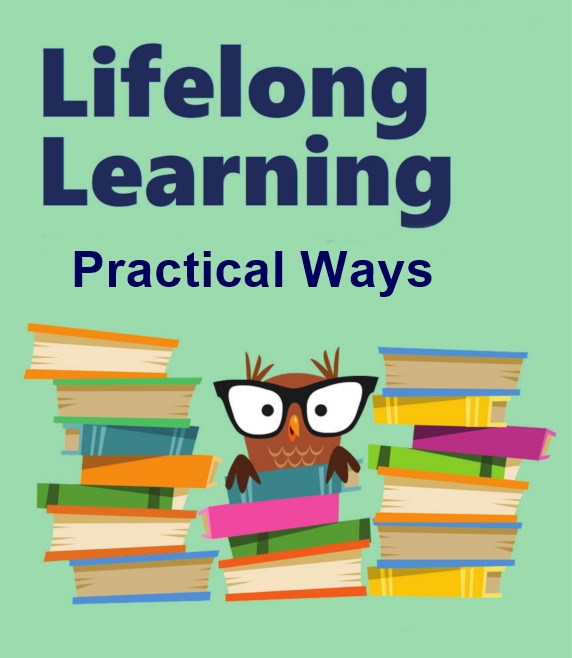Lifelong Learning

Life long learning is the continuous pursuit of knowledge and skills throughout one’s life. It is driven by curiosity and a desire for personal growth. It’s about embracing the joy of discovery, staying open to new ideas. It helps in finding purpose through intellectual and creative exploration. This process not only enriches our lives but also keeps our minds sharp, adaptable, and engaged with the world. Below, I’ll explore the essence of lifelong learning, its benefits. I will explain how picking up new skills or hobbies can reignite passion and purpose, with practical examples to illustrate its impact.
The Essence of Lifelong Learning

Lifelong learning is rooted in curiosity—a natural human drive to understand, explore, and grow. It’s the spark that leads someone to pick up a book on astronomy after stargazing. Enroll in a coding bootcamp at 50, or learn pottery just for the thrill of creating something with their hands. Unlike formal education, which often has a defined endpoint, lifelong learning is self-directed, flexible, and deeply personal. It’s about learning for the sake of growth, not just for credentials or career advancement, though those can be welcome byproducts.
The joy of lifelong learning lies in its ability to transform routine into adventure. It turns a mundane evening into an opportunity to master a new recipe. Learn a language, or understand the physics of a black hole. This pursuit keeps life vibrant, as every new skill or piece of knowledge opens doors to new experiences, perspectives, and connections.
Benefits of Continuous Learning

Continuous learning offers a wide range of benefits that enhance mental, emotional, and social well-being. Here are some key advantages:
- Cognitive Health and Mental Agility Learning new skills or subjects keeps the brain active, improving memory, problem-solving, and critical thinking. Studies suggest that engaging in intellectually stimulating activities can delay cognitive decline. For example, a 2014 study in Neurology found that activities like learning a new language or playing a musical instrument can enhance cognitive reserve, helping the brain stay resilient against aging.
- Personal Fulfillment and Confidence Mastering a new skill boosts self-esteem and provides a sense of accomplishment. Whether it’s completing a painting or solving a coding problem, the process of overcoming challenges fosters resilience and pride. This sense of achievement can reignite passion for life, especially during periods of stagnation.
- Adaptability in a Changing World In a rapidly evolving world, continuous learning ensures relevance and adaptability. For instance, professionals who learn new technologies, like AI tools or data analysis, stay competitive in their careers. On a personal level, learning about cultural trends or new communication platforms (like navigating social media) helps bridge generational gaps.
- Social Connection and Community Learning often involves interaction with others, whether through classes, online forums, or hobby groups. These connections foster a sense of belonging and shared purpose. For example, joining a local photography club can lead to new friendships and collaborative projects.
- Emotional Resilience and Purpose Engaging in meaningful learning can combat feelings of boredom, burnout, or lack of direction. It provides a sense of purpose by aligning with personal values or passions. For someone feeling stuck, learning a new skill like gardening can reconnect them with nature and provide a meditative outlet.
Examples of How New Skills or Hobbies Reignite Passion and Purpose

To illustrate the transformative power of lifelong learning, here are a few examples of how picking up new skills or hobbies can spark joy and meaning:
- Learning a Musical Instrument Take Sarah, a 40-year-old accountant who felt her life had become a monotonous cycle of work and chores. On a whim, she signed up for guitar lessons. Initially, the challenge of strumming chords was frustrating. As she progressed, she found herself eagerly practicing each evening. Playing music became a creative outlet, reducing stress. It gave her a new way to express herself. She joined a local band, which not only boosted her confidence but also introduced her to a vibrant community of musicians. The guitar reignited her passion for creativity, something she hadn’t felt since her youth.
- Exploring a New Language Consider Raj, a retiree who decided to learn Spanish to connect with his heritage. Through online courses and language meetups, he not only gained fluency but also discovered a love for Latin American literature and culture. This pursuit gave him a renewed sense of identity and purpose, leading him to volunteer as a translator for a local community center. Learning Spanish transformed his retirement from a time of aimlessness to one of cultural exploration and service.
- Mastering a Craft Like Pottery Emma, a busy parent, felt she had lost touch with her creative side. She enrolled in a pottery class at a community center, initially just to try something new. The tactile joy of shaping clay and the satisfaction of creating functional art pieces—like a mug she used daily—brought her immense joy. Pottery became a meditative practice, helping her manage stress and rediscover her artistic identity. She even started selling her creations online, turning a hobby into a small side hustle that boosted her sense of purpose.
- Diving into Technology John, a 55-year-old teacher, decided to learn coding to better understand his students’ interests. Through free online platforms like Codecademy, he picked up Python and started creating simple educational games for his classroom. This new skill not only made his teaching more engaging but also gave him a sense of mastery in a field he initially found intimidating. His passion for teaching was reignited as he connected with students in a new way. He even began mentoring others in his age group to explore technology.
Practical Ways to Embrace Lifelong Learning

To experience the joy of lifelong learning, start small and align your pursuits with your interests or goals:
- Explore Online Platforms: Websites like Coursera, Khan Academy, or YouTube offer courses on everything from photography to quantum physics.
- Join Local Groups: Look for community classes or hobby groups (e.g., book clubs, cooking classes, or hiking groups) to combine learning with social connection.
- Set Micro-Goals: Commit to learning one new thing a week, like a recipe, a language phrase, or a yoga pose, to build momentum.
- Experiment Freely: Try something outside your comfort zone, like dance or woodworking, without worrying about perfection.
- Reflect and Share: Journal about your learning journey or share your progress with friends to stay motivated.
Conclusion
The joy of lifelong learning lies in its ability to keep life dynamic, meaningful, and full of possibility. By staying curious and embracing new skills or hobbies, we unlock cognitive, emotional, and social benefits that enrich our lives. Whether it’s strumming a guitar, speaking a new language, shaping clay, or coding a game, each new pursuit can reignite passion and purpose, reminding us that growth is a lifelong adventure. So, pick something that sparks your curiosity today—it might just light up your world.
